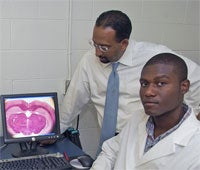
URI to boost the ranks of minority science, engineering professors
KINGSTON, R.I. — July 1, 2005 — Growing up in South Carolina, Brian Brock was always intrigued by science. It’s a family legacy since his mother taught high school science.
Today Brock is pursuing a master’s degree in pharmacology and toxicology at the University of Rhode Island. He is part of a team of URI scientists, headed by Pharmacy Professor Nasser Zawia, investigating whether early exposure to lead could cause the onset of adult diseases such as Alzheimer’s. Brock has a personal interest to pursue this line of research. A member of his family died of the debilitating disease and his other research experiences have been in this field.
Brock is African-American, an underrepresented minority in the science, technology, engineering and mathematics (STEM) fields. While the number of highly skilled technical workers is a major concern nationally, the problem is particularly acute in underrepresented minorities–African Americans, Hispanic, and Native Americans/Alaskan natives. While comprising nearly 26 percent of the U.S. population in 2000, the underrepresented minorities made up approximately 8 percent of the total science and engineering workforce. At URI, in the fall of 2004, there were three (out of 276) minority students enrolled in STEM master degree programs and two (out of 137) in doctoral degree programs.
URI was recently awarded a five-year, $750,000 National Science Foundation grant to recruit, mentor, educate and retain minority graduate students in the STEM fields. The overall goal is to create a diverse group of professors who can serve as role models.
“Minorities are severely under-represented in the hard sciences nationally,” said Lynn Pasquerella, interim vice provost for graduate studies, research and outreach at URI. “Minority faculty members are critically needed as role models for our students.”
“Science, technology, and engineering are the cornerstones of our society,” she continued. “URI is seeking to remove social and educational barriers to careers in the STEM disciplines for members of underrepresented groups who bring different viewpoints, perspectives, skills, and values to the scientific table, which inevitably help broaden and integrate scientific practices with societal needs.”
URI is a member of the Northeast Alliance for Graduate Education and the Professoriate comprised of 15 colleges and universities who work with partner institutions that historically serve minority populations. According to the University of Massachusetts-Amherst, the lead institution, the first phase of the project (1999 to 2004) which included five alliance institutions and five partner institutions resulted in a 32-percent increase in minority enrollments.
URI will use the alliance grant to hire a full-time recruiter with staff support in its Graduate School. Diversity teams of faculty, students, and alumni will visit partner institutions to encourage undergraduates to consider pursuing Ph.Ds. URI faculty members who have signed on are Harold Bibb, biology; Nasser Zawia, pharmacy; Joan Peckham, computer science; Mercedes Rivero-Hudec, chemical engineering; and Jaycoda Major, chemistry.
Brock, the URI graduate student, will help recruit, assist with a multicultural graduate student orientation, and lead workshops. He is more than willing to be a mentor, someone who can discuss keys to success. Students, he noted, discussed a variety of issues at a recent alliance conference. For example, some assumed they were “tokens” and not judged on their merit. Another issue discussed was the uncomfortable feeling of isolation in a classroom where they were often the sole minority. Other issues discussed were equal access to resources and the lack of minority professors and mentors.
“Minorities will not be the only beneficiaries of the alliance grant,” he says. “Diversity opens the knowledge base for everyone.”
URI News Bureau Photo by Michael Salerno Photography.

